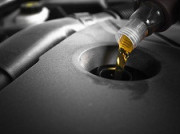How to Keep Our Water Clean
Everyday household activities contribute to water pollution. When it rains, fertilizer from lawns, oil from driveways, paint and solvent residues from walls and decks and even pet waste are all washed into the same waters we rely on for our drinking water supply. Also, improper handling of materials around the house can lead to pollution. Here are some ways you can help reduce your impact on waterways.
In Your Yard
1. Use native plants and natural fertilizers. Native plants need less water, are more tolerant of drought conditions, cost less to maintain and provide habitat for birds and butterflies. Apply natural fertilizers and soil conditioners, such as compost, peat, rotted manure, and bone meal to stimulate plant growth and retain soil moisture. You can create your own compost; compost bins are widely available for purchase, or you can make your own. Composting decreases the need for chemical fertilizers, helps soil retain moisture, and diverts waste from landfills.
2. Don't over-water lawns and gardens. According to the EPA, "nationwide, landscape irrigation is estimated to account for almost one-third of all residential water use, totaling more than 7 billion gallons per day." Most obviously, limit irrigation to vegetated areas -– prevent overspray onto sidewalks, driveways, and street curbing. Avoid sprinkler irrigation on steep slopes and narrow strips that cannot be watered efficiently. Know how much water your lawn is getting by using a rain gauge to track precipitation and match the amount of water you apply to the actual needs of your variety of turf. For non-turf areas, use slow-watering techniques, i.e. trickle or "drip" irrigation systems and soaker hoses, which are 20 percent more efficient than sprinklers. Over-watering lawns not only wastes water, but can also increase the leaching of fertilizers into groundwater. Watering before the sun comes up, or after it sets, will also decrease the amount of water lost to evaporation.
In Your Home
3. Recycle and dispose of all trash properly. - Have your trash pickup up by the local sanitary service company of your area. Recycle all material that is recyclable.
4. Correctly dispose of hazardous household products. Keep paints, used oil, cleaning solvents, polishes, pool chemicals, insecticides, and other hazardous household chemicals out of drains, sinks, and toilets. Many of these products contain harmful substances -- such as sodium hypochlorite, petroleum distillates, phenol and cresol, ammonia and formaldehyde -- that can end up in nearby water bodies. Contact your local sanitation, public works, or environmental health department to find out about hazardous waste collection days and sites. Additionally, incorrect disposal of pharmaceuticals and personal care products leads to the presence of pharmaceutical residues in our waterways and, ultimately, our drinking water. To keep pharmaceuticals and personal care products out of waterways, never flush them down the toilet. The best way to dispose of these items is through "take-back" programs where drugs are returned to a facility that can dispose of them properly. Contact your local health officials or household hazardous waste facility to find out what options exist in your region.
5. Use nontoxic household products whenever possible. Discarding harmful products correctly is important, but not buying them in the first place is even better. Ask local stores to carry nontoxic products if they don't already.
Adobe Acrobat document [76.8 KB]
Maintaining Your Car
7. Recycle used motor oil. Don’t pour waste oil into gutters or down storm drains, and resist the temptation to dump wastes onto the ground. A single quart of motor oil that seeps into groundwater can pollute 250,000 gallons of drinking water. When you buy motor oil, ask if the store or service station has a program to buy back waste oil and dispose of it properly. Keep up with car maintenance to reduce leaking of oil, coolant, antifreeze and other hazardous fluids.
8. Be "green" when washing your car. Skip the home carwash. Take your car to a professional –- professional carwashes are required to drain their wastewater into sewer systems, where it is treated before being discharged. Many carwashes also recycle their wastewater, and use less than half the amount of water of a home carwash. Alternatively, you can "wash" your car at home using a waterless carwash product



